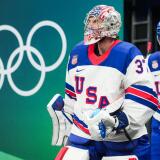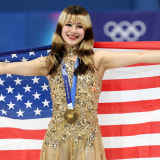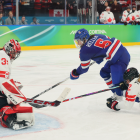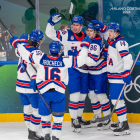2024 Olympics: Noah Lyles, Sha'Carri Richardson were great, but was Paris best ever for U.S. Track & Field?
Four-time Olympian Joetta Clark says 2024 was special, but suggests 1968 warrants an elite rank, too
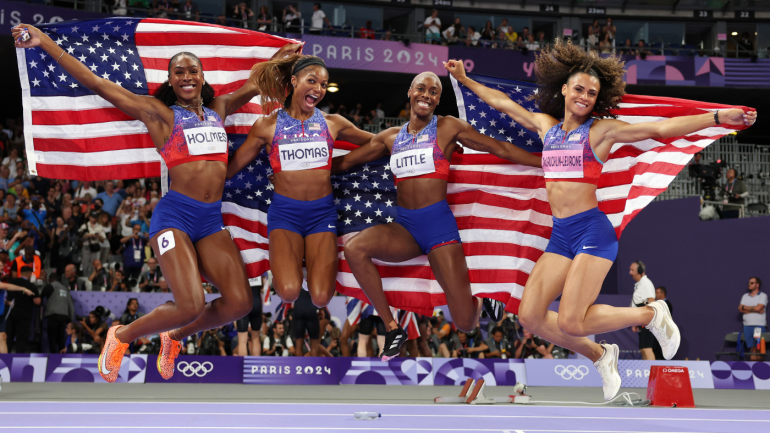
Think about the memorable moments of these Olympics.
Sure, you have your Simone Biles vaults and your Katie Ledecky victory laps. And, yes, two thrilling men's and women's gold medal basketball games between the United States and France. But, aside from those, most of the iconic snapshots of the Paris Games came from the U.S. track & field delegation.
From Noah Lyles' photo-finish coronation as the world's fastest man to Quincy Hall and Cole Hocker coming from nowhere to win the 400 meters and the metric mile, respectively, the Paris Games have been an American masterclass of speed, skill, strength and mettle.
Certainly, when measured against international competition in the rear-view mirror on the 2024 leaderboard. And perhaps going a lot further, too.
It's hardly hyperbolic to suggest this year's U.S. delegation compares favorably to any that's ever competed in home Games or traveled overseas wearing red, white and blue. Throw in Sydney McLaughlin-Levrone's world-record gold in the women's 400 hurdles, Tara Davis-Woodhall's win in the long jump and the virtuoso performances of the women's 4x100- and 4x400-meter relay teams, and it becomes far more difficult to suggest this year's team has a peer.
Particularly when the discussion is limited to medal count.
Or, as four-time Olympian Joetta Clark labels it, "apples to apples."
Clark, whose father, Joe, was played by Morgan Freeman in the movie "Lean on Me," participated in every Games from 1988 to 2000 and is considered "one of the greatest and most consistent" runners in her event -- the 800 meters -- in U.S. history by USA Track & Field.
She was a seven-time U.S. indoor champion, a five-time U.S. outdoor champion, a four-time NCAA champion and a two-time world indoor bronze medalist, and her daughter, Talitha Diggs, was on the 4x400-meter relay team that won the 2022 world title.
So she clearly knows what she's looking at.
Clark, now 62, told CBS Sports that if numbers and perception are the primary criteria, 2024 is indeed an undisputed Olympic champion.
"More people are following it, and more people are aware of their accomplishments," Clark said. "So, if you're counting medals, this is the best team. It's hard to truly say anyone is better than anyone else historically because we were all running fast, but every time they add to their medal count it looks like they're winning all time."
The U.S. had 24 medals on the track and another 10 in the field through the Paris Games.
Three Americans were in an eight-athlete final in Saturday's women's 100-meter hurdles that was won by Masai Russell and the U.S. men's and women's 4x400-meter teams swept gold for the third straight Olympics.
The overall track and field medal count this summer is more than three times higher than second-place Great Britain's 10, and the 14th U.S. gold medal -- seized by that women's 4x400-meter relay win -- are 10 better than Kenya's four.
American runners, jumpers and throwers have averaged 26 medals at each Olympics since 1992 while winning the track and field medal count -- often by a significant margin -- every time. They've not been matched on the leaderboard since a 26-26 tie with the Soviet Union in 1988, which was the last time the Cold War rivals met on Olympic turf.
The U.S. won 16 golds and 40 medals in a home-field victory lap in Los Angeles that was boycotted by several Eastern Bloc countries in 1984, and the Soviets did an equally dominant number on the field in 1980, winning 15 golds and 41 medals in the 1980 Games in Moscow that were not attended by the United States and some others.
The 1984 Games birthed the Olympic legend of Carl Lewis, who was also a 1992 and 1996 contemporary of golden-shoed teammate Michael Johnson. Allyson Felix compiled a U.S. record 11 medals from 2004 to 2020 and Florence Griffith-Joyner earned three golds and a silver at the 1988 Games in Seoul.
Whether this year's winners will rise to that level of stardom is to be determined, but Clark, who's known Lyles since he was a child, said his dual-medal achievement (gold in 100, bronze in 200) is certainly among her takeaway moments from the Games in Paris.
"To watch him do what he does now after knowing him basically since birth is special," she said. "It's not typical in those events."
Clark said Hall's stirring stretch drive in the 400 and Hocker's win in the 1,500 -- the second for the U.S. in three Olympics after a 112-year drought -- earned long-term spots in her track memory alongside Lyles, as did Valerie Allman's repeat gold in the women's discus and Ryan Crouser's three-peat in the men's shot put.
But, she said, it's not so cut and dried that the 2024 team is preeminent by every measure.
In fact, regardless of medal counts or social media trends, it's still her contention it's the 1968 team -- whose 15 golds are second only to the 1984 team's boycott-aided number -- that rises to that level considering the other factors at play 56 years ago in Mexico City.
"It's 1968," Clark said. "When you consider the difficulty of the trials that team went through, then it's the best team, hands down."
Recognized most often for the glove-handed podium salutes by John Carlos and Tommie Smith, that team was chock full of its own noteworthy athletic performances.
Bob Beamon obliterated the world long jump record by nearly 22 inches. Lee Evans set a world record in the 400 meters that stood for nearly 20 years. And no fewer than six other world marks -- in the men's 100 meters, 200 meters, 4x100-meter relay and 4x400-meter relay, and the women's 100 meters and 4x100-meter relay -- failed to make it to the closing ceremonies.
And, given the significant advancements made in training, equipment and financial support for athletes in the generations since, it's only natural medals should follow. But if all things are equal, Clark insists, old school remains superior.
"The coaching was always good, though they're operating with a better knowledge base now," Clark said. "The financial support and the sponsorships allow athletes to dedicate more time and energy to being elite. And overall, I think people really take it for granted."





